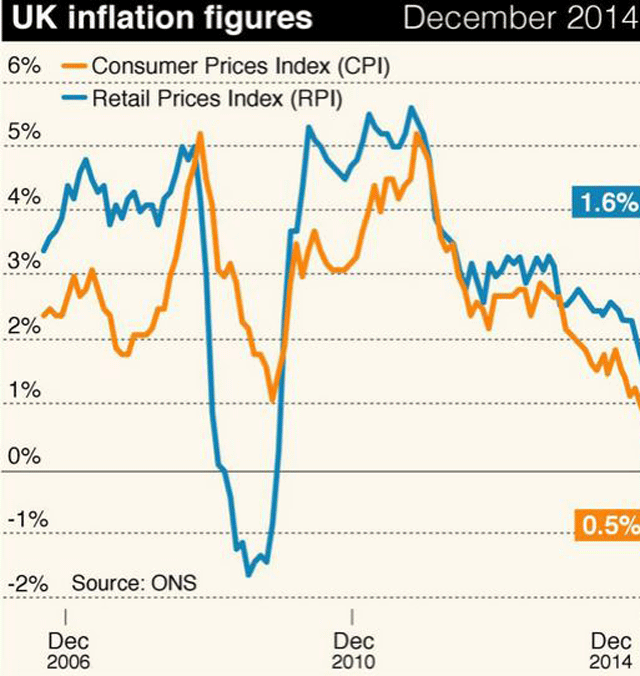Inflation plummets to lowest level on record

Inflation has tumbled to its lowest level on record as sliding food and petrol prices plus subdued utility bills helped provide what was described as a "giant tax cut for the economy".
The Consumer Price Index (CPI) measure of inflation fell to 0.5% in December, equal to the rate in May 2000 which has not been lower since CPI records began in 1989, official figures showed.
Economists said that the continued plunge in the oil price meant it was likely to fall further and that brief period of negative inflation was "not entirely out of the question".
The plunge in CPI to below 1% will trigger a letter of explanation from Bank of England governor Mark Carney to Chancellor George Osborne because it is more than 1% off the Bank's 2% target.
While it be welcomed for boosting household budgets and lifting the real terms value of wages, there will be concern about the spectre of a period of falling prices.
The sharpness of the decline brings the UK uncomfortably close to the scenario in the eurozone where there are fears of a damaging deflationary spiral after inflation fell to minus 0.2%.
But the boost to households should lift the economy by stimulating consumer spending as well as providing a tonic to the Coalition ahead of the general election in May.
Mr Osborne said: "Inflation is at its lowest level in modern times. We have family budgets going further and the economic recovery starting to be widely felt.
"We will always remain vigilant that we have lower inflation for the right reasons. And today is yet further proof our long term plan is working."
Prime Minister David Cameron wrote on Twitter: "The fall in #inflation is good news for families. Our long term economic plan is on track and helping hardworking taxpayers."

Danny Alexander, Chief Secretary to the Treasury, said: "These figures show that the falling price of oil is working its way into lower prices.
"This acts like a giant tax cut for the economy, putting more money in the pockets of hard pressed consumers."
Shadow Treasury minister Shabana Mahmood said: "Plummeting global oil prices are the reason why the rate of inflation is falling here in Britain.
"But wages continue to be sluggish and the squeeze on living standards since 2010 means working people are £1600 a year worse off under this government."
Today's figures from the Office for National Statistics (ONS) showed inflation has been dragged down by sliding fuel and food prices, which combined pulled it lower by 0.6% in December.
Flat household and electricity tariffs over the month - compared to a period last year when they were hiked sharply - made a major contribution to the drop in CPI.
The fall means pay hikes should pull further ahead of inflation. Most recent figures showed wages up 1.4% year-on-year. Latest labour market data will be published next week.
Record low inflation also pushes further into the future any need to raise interest rates.
Bank of England policy makers have said they expected CPI to fall below 1% and remain there for months to come.
The ONS figures showed food and non-alcoholic beverages were 1.7% cheaper in December than the same month a year ago, the sixth month in a row of year-on-year declines.
These have been driven by the intense price war between the major supermarkets under pressure from discounters Aldi and Lidl.
Motor fuels fell 10.5% year-on-year, the largest fall since July 2009. The price of a litre of petrol fell by 13.6p between December 2013 and last month, with diesel 15p lower.
Over the month, a litre of petrol fell by 6.1p and diesel by 4.8p.
Paul Hollingsworth of consultancy Capital Economics said inflation was likely to fall further to 0.2% and a brief period of deflation was "not entirely out of the question".
He said the further fall in oil prices since the period covered by the latest figures "should mean that the UK comes within a whisker of deflation soon".
Mr Hollingsworth said Mr Carney's letter to the Chancellor "will presumably highlight the fact that it is temporary factors which are keeping inflation down, not underlying weakness in the economy".
He added: "We doubt that inflation has reached its low point yet though.
"Indeed, the further 20% or so fall in oil prices since December's average level looks set to push CPI inflation to a record low of around 0.2% over next couple of months.
"And given uncertainties surrounding how quickly and to what extent lower oil prices will cause price rises for other goods to moderate, a brief period of deflation is not entirely out of the question."
But with the Bank of England's rate-setting Monetary Policy Committee (MPC) looking further ahead at the medium term outlook for inflation, its current weakness was "likely to only act as a speed limit rather than an outright roadblock to raising interest rates".
Chris Williamson, chief economist at Markit, said: "Wage growth is now beating inflation for the first time since 2009, and looks set to pick up further in coming months.
"This will provide a meaningful boost to real incomes, which should in turn feed through to rising consumer spending.
"With fuel prices falling, more of this real income gain should also be spent on goods other than fuel.
"It's therefore likely that UK economic growth will start to revive again, having waned late last year, on the back of increased consumer spending."
Howard Archer, chief UK and European economist at IHS Global Insight, said: "The Government will certainly be hoping that consumer purchasing power continues to improve through the early months of 2015 and this makes people feel better about life and more prepared to vote for them in May's general election."
Related articles on AOL Money
Why inflation matters to you
How a strong pound affects you
Inflation erodes savings




